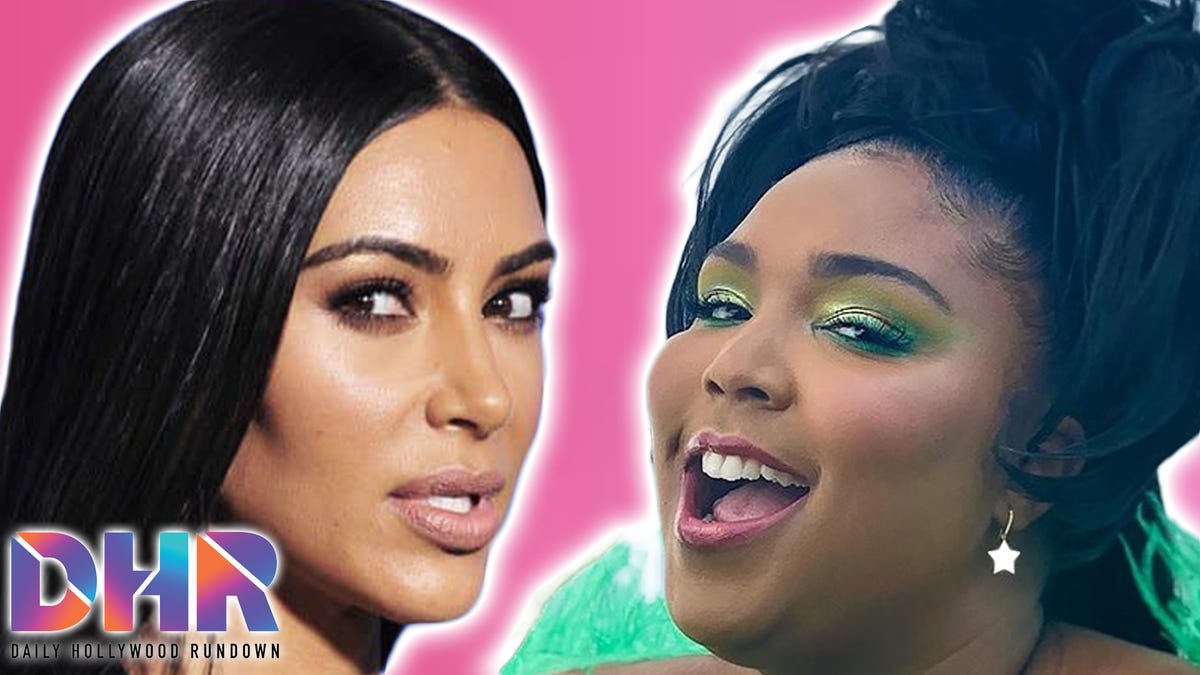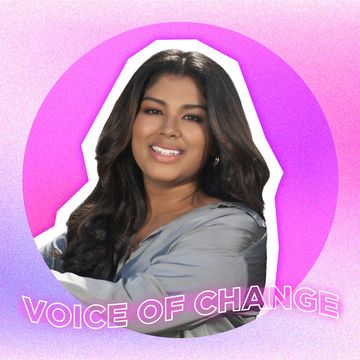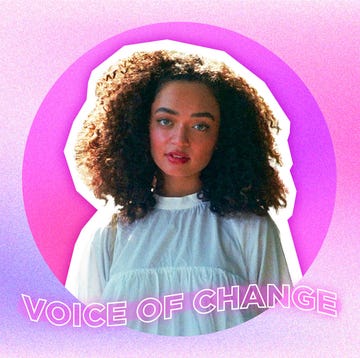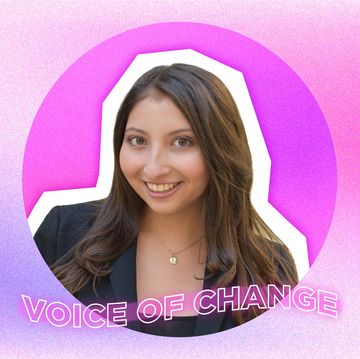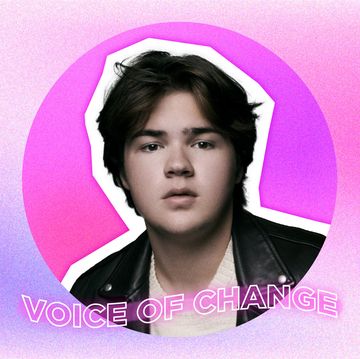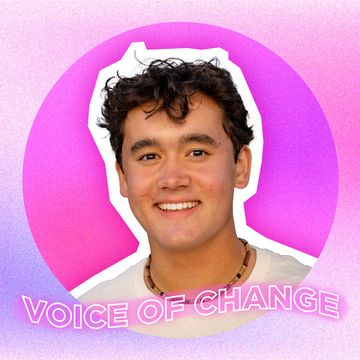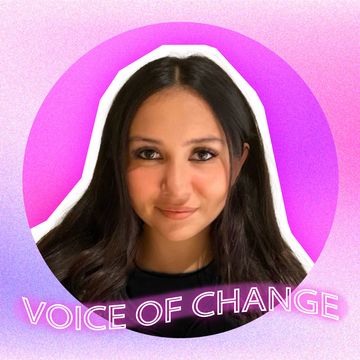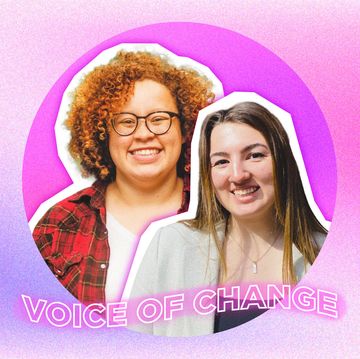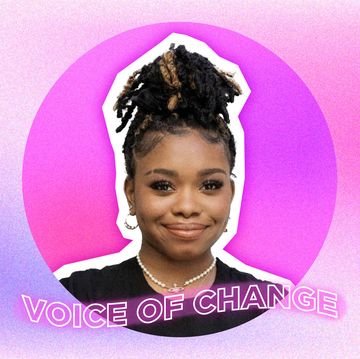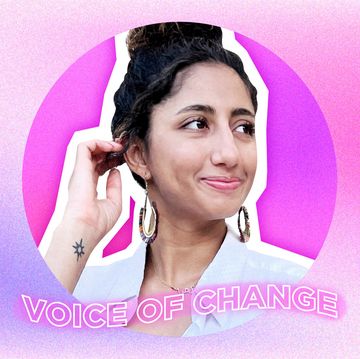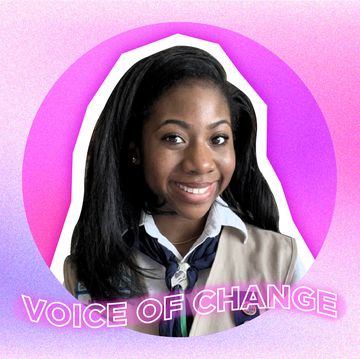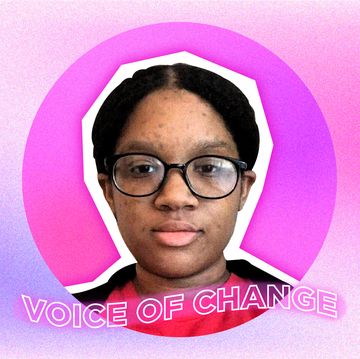Even during the most challenging times in history, it's important to highlight those who are continuing to follow their dreams and are taking strides to make the world a better place. Each month, Seventeen is honoring young people as Voices of Change, those who are making a difference in their community and the world at large.
Education has forever guided Taylor Cassidy. The process of learning, relearning, teaching, and sharing the power of Black history is the catalyst that’s driven the content creator and advocate to where she is today. Molded by the teachings of Black history from her parents, and emboldened by the lack of these types of lessons in school, Taylor turned to TikTok in February 2020 to create a video series dedicated to the facts, figures, and defining moments of Black history. In a series titled “Fast Black History,” Taylor explores the lives of leaders such as Shirley Chisholm, Fannie Lou Hamer, and Maya Angelou in minute-long clips, all the while examining issues such as voting rights, affirmative action, and gentrification.
Fast forward three years later, Taylor’s platform has grown to 2.2 million TikTok followers, 195K Instagram followers, a TEDxGeorgetown Talk, a hosting spot on SiriusXM’s TikTok Radio, and a correspondent position on Nickelodeon’s Nick News (alongside 2022 Seventeen Voices of the Year honoree Kahlil Greene). The “Fast Black History” videos — which Taylor often concludes with the phrase, “Black history is your history” — have grown a huge following, thanks to their ability to make crucial, all-too-often sidelined moments in history accessible and informative. The palpability of Taylor’s passion not only manifests in the way in which they thoughtfully teach, but in the manner they celebrate and lift Black creatives in their other viral series, “Black Girl Magic Minute.”
A film student at New York University and an aspiring screenwriter, Taylor’s journey in teaching and storytelling has only just begun. Here, Taylor Cassidy, Seventeen’s latest Voice of Change, details the biggest lessons in social media activism, the challenges and highlights, and what comes next — hopefully, eventually, a television series of her own à la Quinta Brunson (and we have a feeling she’s well on her way).
17: How have you grown in your advocacy journey?
Taylor Cassidy: I started when I was 17 and once I started doing a lot of Black history videos, I was very quickly labeled “activist.” Over the years, I have learned that I see myself more on the advocacy level. I've grown to learn that activists are more on the side of organizing, enacting change, and being on the ground. But as I've grown older, I've learned that although there is a difference between advocacy and activism, there is importance in both of them. I've matured in the way of putting my heart into advocacy even more, taking it more seriously, and putting more thoroughness in the way that I present certain ideas and forms of representation, because advocacy ultimately does lead to activism.
17: What’s the best piece of advice you've ever received?
TC: There's a piece of advice that I got from Liza Koshy, which I will never forget. Over the years, I find more and more truth in it. She said, "Don’t put yourself in a box and be afraid to break out of it." I feel comfort in that because I feel like as an artist first, I tend to put myself in these constraints of how I'm supposed to present a certain idea or convey a certain message. When in reality, the best way to reach people is to push and challenge myself to go even more in depth and listen to more people, and not be afraid to break my own boundaries.
17: What advice would you give to those hoping to get involved in advocacy?
TC: Start with what you have. It's easy to feel like you need a big audience before diving into something that you care about. But as long as you have a thought, a problem, an issue going on in your life that you feel that fire in, that's enough. If you feel it bad enough, you'll find a way to push it out to the world. Just trust that. Trust that passion, trust that fire, because without it, you have nothing.
17: What has been the biggest challenge since launching your platform?
TC: Growing online. I started at 17, so it was hard in the beginning to differentiate between views and impact. With social media activism, a lot of times you only get the praise, honor, and glory when things go viral. Because of that, people associate viral-ity with impact, making a difference, and reaching people. Over the years, I've learned that that's not true at all. That was a very big thing that I had to learn and grow from. I had a lot of doubts of whether or not the Black history videos I was making, or the social commentary videos I was making, were even going to reach people. But at the end of the day, if what you're saying matters, it doesn't matter how many people are going to look at it. It doesn't matter what publications are featuring you. It's about your passion. That's going to reach somebody and that's enough.
17: What has been the biggest highlight?
TC: When I got to give a TedTalk at Georgetown. That moment felt like an affirmation. Every goal I had set in the beginning, I hadn't left behind. I hadn't abandoned them. I was making an impact. That was very humbling for me, and I will always hold it in my heart.
17: What do you think older generations get wrong about Gen Z content creators?
TC: I think they think it's easy. Being online is very flexible, but I believe that a lot of people think that it's easy to constantly put yourself out there, put your personality out there, put your views and beliefs out there, and be around the clock, 24/7, susceptible to criticism and backlash, or potential corrections if you got something wrong. That takes a lot of strength and persistence. That should be acknowledged more, especially with Gen Z. We've had to grow up in very rough political climates and social change, so we've already had to build up a lot of strength and persistence. At the same time, we're putting it online with older and younger generations having discourse about it.
17: Is there something you wish you had known earlier about social media activism and content creation?
TC: Have more patience. I tell myself to have more patience with seeing change happen. In the beginning, I thought that if change didn't happen in a month, it didn't work, so you had to do, change, or believe something else. But that's not the reality. Activism and advocacy is a constant progress of relearning, educating yourself, correcting yourself, and taking criticism. That never stops. That requires patience.
17: What are your favorite videos to create?
TC: To this day, I love making my Fast Black History videos. These allow me to learn something new and actually delve into the person that I'm talking about. It always, without fail, gives me the sense of who they were. It makes me appreciate the change that they made in my life now. My series are so special to me because every time I learn about a figure in history, I always find a part of them that I can keep in myself, or a part of them that I see in myself. That is something that I don't think I could ever be without.
17: How do you protect yourself from burnout?
TC: A lot of quiet moments. I spend a lot of time alone, and when I say alone, I mean off of my phone, away from friends and if I'm talking to anybody, it's going to be my family. That is the only way that I have been able to maintain mental health and peace while navigating everything. I had a phone call with my Nana two days ago. It was a 50-minute phone call, and just by hearing her voice, it grounded me and reminded me of where I came from.
17: What do you hope to accomplish next in your career?
TC: I'm studying to be a screenwriter — I would love to write for TV and create my own show. I'm writing a book. I'm going to continue Fast Black History, Black Girl Magic Minute. Honestly, most of all, I'm going to try my very best to go slow in this process and not grow up too quickly. I'm only 20. I'm trying to make it a point to go slow and not rush, so that I can take each and every step of this already beautiful journey fully.
17: What does being a Voice of Change honoree mean to you?
TC: It means everything. I'm humbled that I can even be called a Voice of Change. I was just thinking today about how I started all of this from my high school bedroom, and every single time that something like this happens, I can't help but remember the fire that started all of this. It has me looking back and appreciating everything that I've learned, everything that I want to learn in the future. It's humbling me and it makes me want to continue elevating myself as not only a Voice of Change, but in enacting more change in the future.
Leah Campano is an Associate Editor at Seventeen, where she covers pop culture, entertainment news, health, and politics. On the weekends, you can probably find her watching marathons of vintage Real Housewives episodes or searching for New York City’s best almond croissants.

